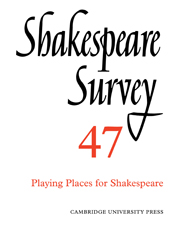Book contents
- Frontmatter
- Shakespeare Played Small: Three Speculations about the Body
- The Architecture of the Fortune Playhouse
- The Bare Island
- ‘How Chances it they Travel?’ Provincial Touring, Playing Places, and the King’s Men
- Writing for the Metropolis: Illegitimate Performances of Shakespeare in Early Nineteenth-Century London
- The Perishable Body of the Unpoetic: A. C. Bradley Performs Othello
- Playing Places for Shakespeare: The Maddermarket Theatre, Norwich
- ‘A Fairly Average Sort of Place’: Shakespeare in Northampton, 1927–1987
- The Living Monument: Self and Stage in the Criticism and Scholarship of M. C. Bradbrook
- Stratford Stages: Interviews with Michael Reardon and Tim Furby, and Sam Mendes
- Dis-Covering the Female Body: Erotic Exploration in Elizabethan Poetry
- Theseus’ Shadows in A Midsummer Night’s Dream
- ‘Time for Such a Word’: Verbal Echoing in Macbeth
- Shakespeare’s Knowledge of Italian
- Tamburline and Edward Alleyn’s Ring
- Shakespeare Performances in England, 1992–1993
- Professional Shakespeare Productions in the British Isles, January-December 1992
- The Year's Contributions to Shakespeare Studies 1 Critical Studies
- 2 Shakespeare’s Life, Times, and Stage
- 3 Editions and Textual Studies
- Books Received
- Index
The Year's Contributions to Shakespeare Studies 1 - Critical Studies
Published online by Cambridge University Press: 28 March 2007
- Frontmatter
- Shakespeare Played Small: Three Speculations about the Body
- The Architecture of the Fortune Playhouse
- The Bare Island
- ‘How Chances it they Travel?’ Provincial Touring, Playing Places, and the King’s Men
- Writing for the Metropolis: Illegitimate Performances of Shakespeare in Early Nineteenth-Century London
- The Perishable Body of the Unpoetic: A. C. Bradley Performs Othello
- Playing Places for Shakespeare: The Maddermarket Theatre, Norwich
- ‘A Fairly Average Sort of Place’: Shakespeare in Northampton, 1927–1987
- The Living Monument: Self and Stage in the Criticism and Scholarship of M. C. Bradbrook
- Stratford Stages: Interviews with Michael Reardon and Tim Furby, and Sam Mendes
- Dis-Covering the Female Body: Erotic Exploration in Elizabethan Poetry
- Theseus’ Shadows in A Midsummer Night’s Dream
- ‘Time for Such a Word’: Verbal Echoing in Macbeth
- Shakespeare’s Knowledge of Italian
- Tamburline and Edward Alleyn’s Ring
- Shakespeare Performances in England, 1992–1993
- Professional Shakespeare Productions in the British Isles, January-December 1992
- The Year's Contributions to Shakespeare Studies 1 Critical Studies
- 2 Shakespeare’s Life, Times, and Stage
- 3 Editions and Textual Studies
- Books Received
- Index
Summary
GENERAL STUDIES AND COLLECTIONS
At the very moment of finishing this review the British Prime Minister, John Major, has denounced ‘airy-fairy theory’ as part of a more general demonizing of the inheritance of the sixties which has marked the last year or so of political discourse in Britain. It is tempting to see Brian Vickers’s counterblast to current literary theory, Appropriating Shakespeare (New Haven and London: Yale University Press, 1993) as animated by very much the same hostility. It has been greeted already with considerable enthusiasm by those who feel alienated from, threatened by or contemptuous of the directions in which critical practices have been moving for the last thirty years or so. Like John Major, Vickers sees the sixties as the cause of our going astray. Unlike the politician, however, Vickers mounts his attack not out of a vague nostalgia and determined anti-intellectualism, but through a detailed and systematic scholarly critique of the appropriation (or misappropriation) of the work of Saussure which he argues underlies French literary theory. In subsequent chapters Vickers attacks each modern ‘heresy’ in turn. Deconstructionists don’t understand how language works; psychoanalysts are doomed to failure because their founding father is a fraud; new historicists just don’t do their history well enough; feminists (like everyone else) misread the texts because of their determination to find their own political/ideological theories represented therein; Christians and (some) Marxists – oddly bracketed together – are guilty of treating texts as allegories. There are many shrewd hits in the course of the book and some occasional touches of pure vituperatio that enliven what is sometimes a rather stodgy (and very long) text.
- Type
- Chapter
- Information
- Shakespeare Survey , pp. 221 - 235Publisher: Cambridge University PressPrint publication year: 1994



